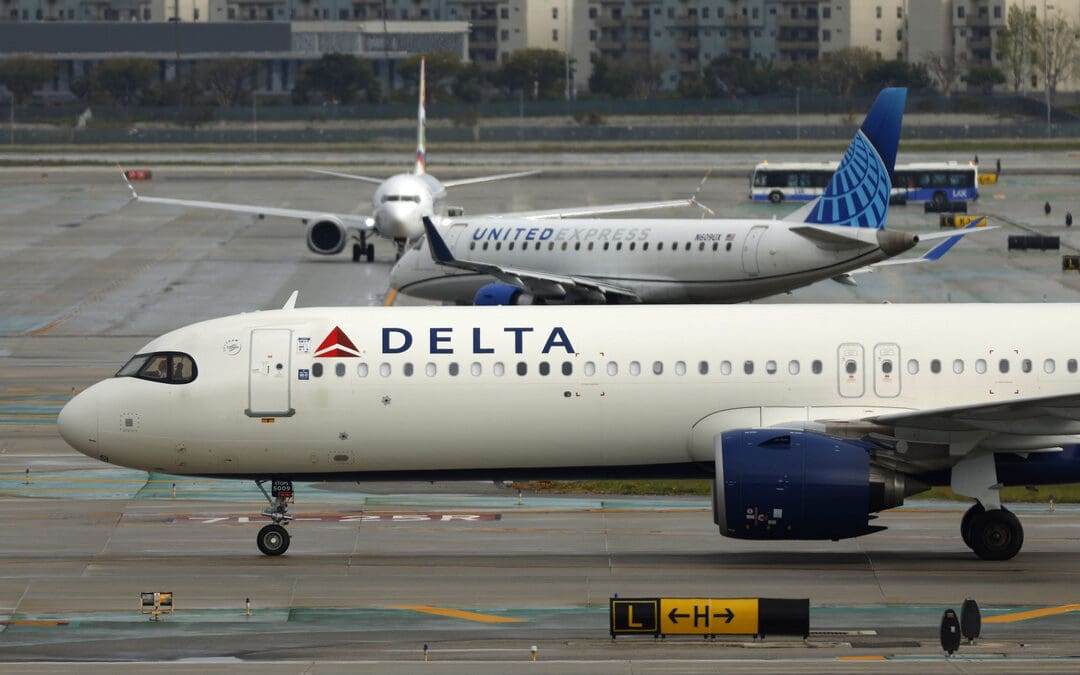
Bad Politics Poisons Science
April 7, 2025
Most Americans want to read more books. We just don’t.
April 7, 2025
Private equity firms are increasingly targeting the little-known companies that fix planes for commercial airlines — preying on an industry with already weakened oversight and further stoking aviation safety advocates’ fears.
In the past, commercial airlines in the United States did the critical work of inspecting and repairing their fleets in-house, employing teams of mechanics to conduct airplane maintenance at their facilities across the country. But over the last two decades, repairs have increasingly been outsourced to third parties, many of which operate overseas.
Now private equity — the opaque industry known for hollowing out companies in search of short-term profits — is moving in.
According to a recent report from PitchBook, a financial data service, private equity investors have flooded the airplane maintenance industry over the last five years, driving an increasing number of deals, which reached a high of twenty-four last year. “Private equity interest in the . . . sector shows no signs of slowing,” analysts concluded. The market, they wrote, was “ripe for consolidation plays.”
For decades, advocates have been sounding the alarm about the potential dangers of US airlines outsourcing maintenance overseas, where oversight by US regulators is more limited. Consolidation in the multibillion-dollar industry, paired with private equity’s cost-cutting, extractive playbook, may make things worse.
“Private equity is not there for the long term,” former US representative Peter DeFazio (D-OR), who worked closely on federal aviation policy for decades, told the Lever. “They want to bleed cash and take out equity and then put a bunch of debt on the company. And that can lead to problems.”
In the aviation industry, this could be a particularly dangerous model, DeFazio warned.
“Whenever financial pressure is exerted in an industry like this, very, very bad things can happen,” he said.
As the aviation repair industry has grown, airlines and third-party maintenance companies have fought to beat back efforts to bring operations under greater oversight by federal regulators. Now that Wall Street has a stronger grip on the industry, accountability may grow even further out of reach.
Not only is private equity consolidating the industry, it is increasing the industry’s political influence, industry veteran William McGee, a senior fellow for aviation and travel at the American Economic Liberties Project, told us. “They are consolidating their lobbying footprint, consolidating their ability to exert pressure in Washington,” he said. “They are getting more powerful.”
One of the biggest players in what’s known as the “maintenance, repair, and overhaul” (MRO) industry is MRO Holdings, a company that advertises itself as one of the biggest airplane maintenance providers in the Americas. One of its subsidiaries, Aeroman, owns a massive maintenance center in El Salvador, where many of the most prominent US airlines now send their planes for repairs and inspections, including JetBlue, Delta, and Southwest.
Some of these airlines, like Southwest, do not fly commercial routes through El Salvador. Still they are increasingly sending their planes to the country to be serviced. Other common overseas destinations for maintenance include China and Singapore.
Decades ago, this was an uncommon practice. In the 1980s, most US airlines had their own maintenance divisions, which performed all the “heavy maintenance” for their aircraft — i.e., comprehensive maintenance checks, inspecting the plane’s fuselage for corrosion, and evaluating its engine and flight controls (as opposed to unscheduled repairs on runways). The FAA has extensive routine maintenance requirements for air carriers.
In 1983, before it was acquired by MRO Holdings, Aeroman was one of these in-house shops. The company operated as a division of the Salvadoran airline TACA Airlines (now known as Avianca), working on the airline’s fleet.
This changed when, in the early 2000s, US airlines began to look at new ways to cut costs. Many faced significant revenue losses in the wake of the 9/11 attacks, which disrupted commercial air travel in the United States for years.
While outsourcing airplane maintenance — a phenomenon that followed the deregulation of the airlines under President Jimmy Carter in 1978 — was not unheard of, it quickly accelerated at the turn of the century.
Outsourcing allowed airlines to replace union jobs in the United States — airplane mechanics have historically been well organized — with cheaper foreign labor. And while the Federal Aviation Administration (FAA) must still certify and inspect overseas maintenance hubs, it’s far more difficult for inspectors to visit a facility in El Salvador or China than one in Oklahoma. In addition, these facilities are subject to different security and inspection standards than US repair centers.
“The FAA has exempted maintenance work done outside the United States from many safety standards,” John Samuelson, the president of the Transportation Workers Union, which represents many airline mechanics, testified at a congressional hearing in 2019. These exemptions had led to, he said, “a two-tier safety system that encourages airlines to offshore more and more work, introducing more and more risk into our aviation system.”
In 2006, as Aeroman started doing business with US airlines, a Canadian aviation company acquired the company. It then began expanding its operations in El Salvador. By 2019, Aeroman was the largest maintenance center in Latin America and had been acquired by MRO Holdings, which over the years has expanded by buying up various other aviation maintenance companies. MRO Holdings is incorporated in the tax haven of Panama, although it has a headquarters in Jacksonville, Florida, and is led by executives who come from the US aviation industry.
MRO Holdings, in turn, is backed by powerful private equity investors. It is owned by Caoba Capital, a private equity firm in El Salvador. Last year, Bain Capital, a global private equity firm, announced a minority investment in the company, promising that MRO Holdings was “well-positioned to continue its upward trajectory and capitalize on attractive market opportunities.”
The story of Aeroman — a company that began as an airline repair shop and now has fallen into the hands of private equity — is hardly unique. MRO Holdings owns maintenance hubs in Mexico, and US private equity firms now back several other major companies that own airplane repair shops, including AFI KLM E&M, which owns facilities in China and Malaysia and is backed by private equity behemoth Apollo Global Management.
Maintenance outsourcing by US airlines over the decades set the stage for this consolidation, and it appears the practice is becoming more common. As of 2018, US airlines outsourced on average about half of their maintenance costs to facilities in foreign countries, compared to less than a third in the early 2000s.
“The single greatest threat to airline safety is maintenance,” McGee said. “Because we don’t know who’s fixing the planes, where they’re fixing them, when they’re fixing them, and if they’re doing it correctly.”
While accidents related to maintenance outsourcing have been rare — although not unheard of — researchers have documented how outsourcing critical maintenance can create lapses in communication and introduce new economic pressures. It is part of a broader aviation trend of farming out more and more work to subcontractors, an issue that came into view last year when a Boeing supplier, which was spun off from the company in a private equity deal, faced shocking allegations of fraud and shoddy work.
The same factors that worry the industry’s watchdogs are among those driving private equity interest in the market. In part because many of these maintenance centers, like Aeroman, began as in-house maintenance divisions, the market is still relatively fragmented, which, PitchBook analysts write, allows for “ample opportunities for private equity firms to pursue consolidation strategies and achieve scale advantages.”
Furthermore, the industry is benefiting from Boeing’s ongoing production troubles — which means that its aging planes need more and more maintenance. (The planemaker, beset by scandals, has struggled to win federal approval for its newest 737 MAX models, delaying the rollout.)
“As airlines extend the life of their existing fleets, the need for frequent and comprehensive maintenance has grown, further fueling demand for MRO services,” analysts say.
When private equity enters any industry — whether bowling or health care — it pursues aggressive, high-risk growth strategies in pursuit of quick profits. In the aviation maintenance sector too, the firms are “eyeing opportunities to scale up and drive operational efficiencies,” the industry report says. Critics charge that this leads to eroding quality of work and unsustainable business models in the long run.
“When I hear the term ‘operational efficiency,’ to me, that’s like nails on a blackboard,” McGee said. “Operational efficiency is corporate speak for cutting corners. That’s all it means. So let’s call it what it is.”
As the industry has expanded, so has its footprint in Washington.
The Aeronautical Repair Station Association serves as the lobbying arm of both US and overseas aviation maintenance companies. The organization was founded to represent the nascent industry in the wake of airline deregulation in the late 1970s. According to its vice president of operations, Brett Levanto, the group represents more than three hundred companies, most of which are independent repair shops.
Recently, the group has seen its makeup change. A number of the companies represented by the Aeronautical Repair Station Association, including MRO Holdings, “are either consolidators or have merged with other companies in the past several years,” Levanto said.
In Levanto’s view, the trend will have little impact on safety: “No matter who the corporate entities are, the rules are equivalent,” he said, noting that the FAA has strict maintenance standards and procedures that repair shops will be required to follow — even under new private equity overlords.
But as DeFazio emphasized, the FAA’s rules are only as good as the enforcement. “It’s an industry that should be very highly regulated, and it is highly regulated,” DeFazio said. “But is it overseen?”
As the industry has consolidated, the Aeronautical Repair Station Association has begun spending more money lobbying in Washington, focusing its efforts, according to lobbying disclosures, on FAA enforcement. The association, which Levanto says remains “a regulatory compliance-focused organization,” rarely lobbied before 2010, according to data from OpenSecrets. But over the last five years, the group averaged spending more than $150,000 annually.
These lobbying figures pale in comparison to the millions being spent by Boeing and other major aviation players, the real power brokers of the aviation industry. “It’s not like we have a fleet of lobbyists all over Capitol Hill all the time,” Levanto said, emphasizing that the association remained a small operation.
Yet the expansion of its lobbying work is emblematic of an industry with growing influence.
“These companies — they’re getting more and more powerful,” McGee said.
Advocates for increased oversight of aviation maintenance have scored some victories in recent years. Last year, the FAA issued new requirements for foreign repair stations to conduct drug and alcohol testing of employees, matching standards in the United States. And the last FAA reauthorization bill, which passed in May 2024, for the first time required unannounced inspections of overseas maintenance centers, bringing the rules in line with domestic requirements.
But the aviation lobby has fought hard to beat back other legislative attempts to draw maintenance work back to the United States, such as by imposing new requirements on foreign repair stations or closing loopholes that allowed overseas shops to skirt US rules.
“In general, our position has been that any US government effort to impose additional restrictions on foreign facilities is essentially a waste of time,” said Levanto, noting that there was an “equivalency of safety outcome” regardless of where maintenance work was performed (a claim that McGee and other safety advocates dispute).
In 2023, a bipartisan group of lawmakers, with the backing of airplane mechanics’ unions, introduced a bill that would have updated licensing requirements at overseas repair facilities and required regular reporting to US regulators.
The bill faced opposition from the airlines — and the newly empowered third-party repair lobby, which urged its members to advocate against the legislation. Ultimately the bill stalled in committee.
Great Job Katya Schwenk & the Team @ Jacobin Source link for sharing this story.






